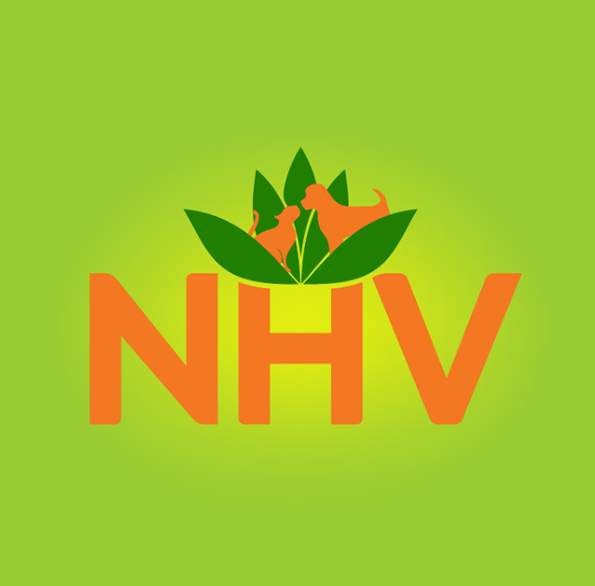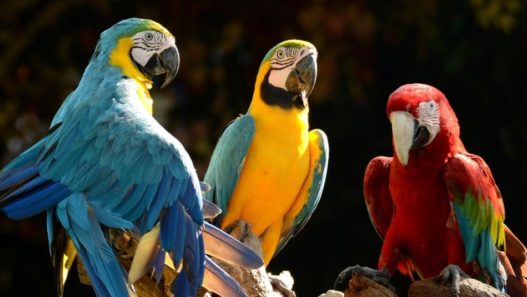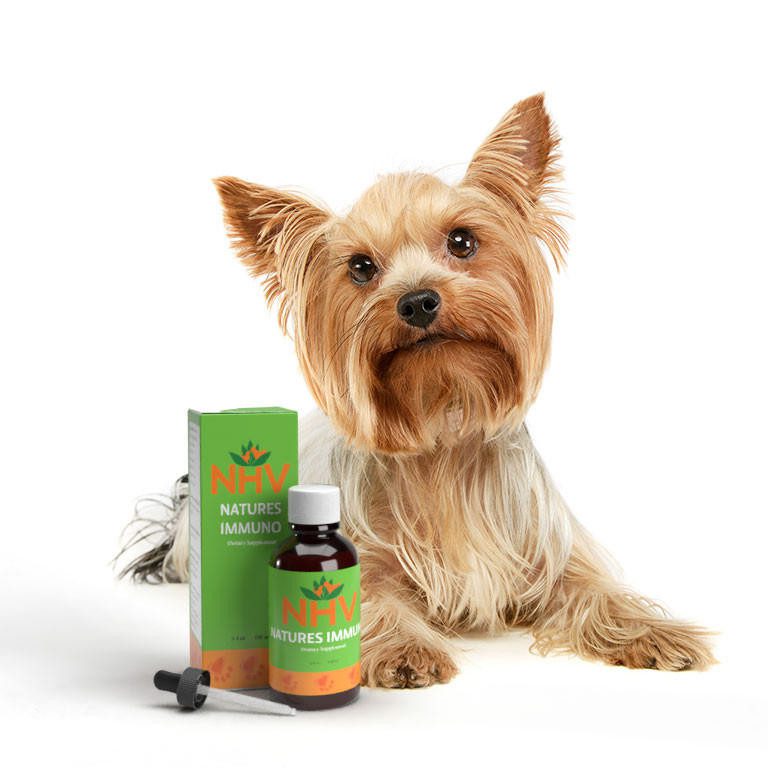

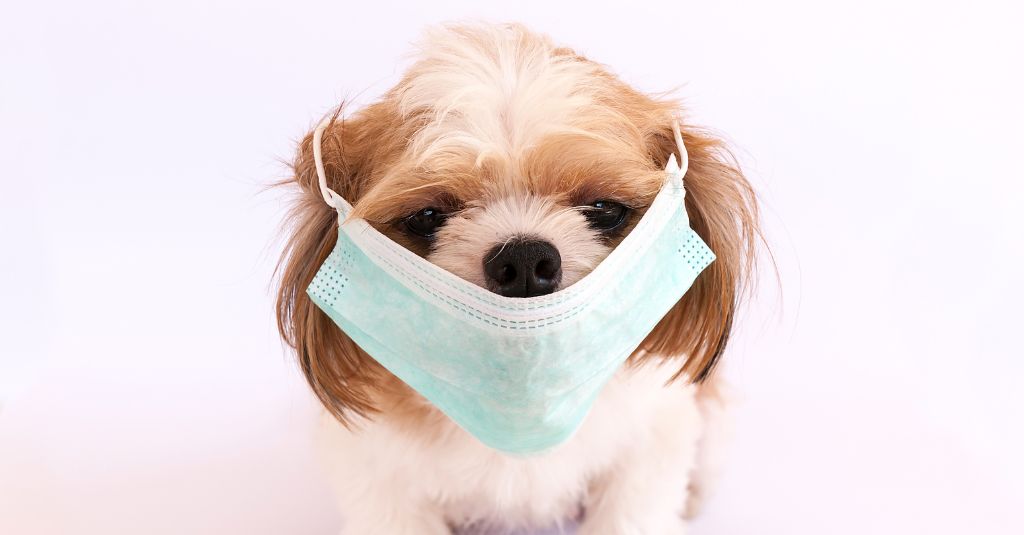
The spread of avian influenza amongst animals has some pet parents asking, “Can pets get bird flu?”
The answer is yes; although cases are rare, bird flu has infected pet birds as well as cats and dogs. We therefore recommend pet parents take a few extra safety precautions and familiarize themselves with the symptoms of Highly Pathogenic Avian Influenza (HPAI) – also known as bird flu or H5N1.
What Is The HPAI Virus?
As the name suggests, the Highly Pathogenic Avian Influenza refers to a severe form of avian influenza, which is a virus. Specifically, HPAI is caused by certain strains of the influenza A virus, which spreads among animals.
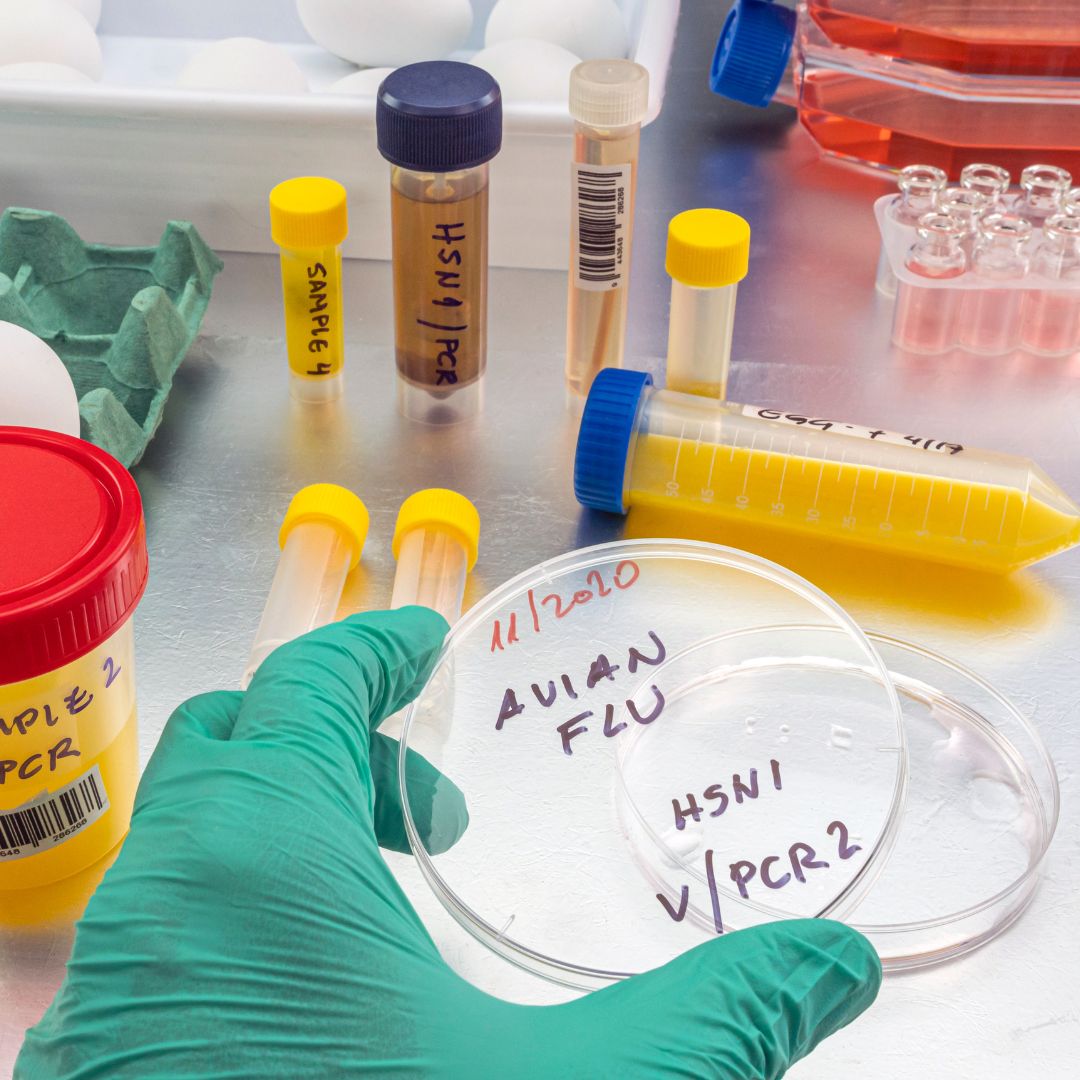
Right now, outbreaks of HPAI are making headlines and worrying some pet parents. It is true that this virus has been recorded as infecting farm animals, pets (including birds, cats, and dogs), and very rarely, people. It can be quite severe for animals that contract it.
Like any virus, HPAI spreads through infected individuals by air (coughs, sneezes, breathing) or body waste. It may also spread when pets interact with wild or domestic animals.
There is no cure for HPAI, so prevention will be a key strategy for pet parents to take.
What Are The Signs of Bird Flu in Pets?
In pet dogs and cats, the signs of HPAI include:
- Fever
- Loss of appetite
- Difficulty breathing
- Red eyes
- Discharge from the eyes and nose
- Neurologic issues, like tremors, seizures, or incoordination
In pet birds, HPAI may present as:
- Decreased energy, movement, or appetite
- Swelling around the head, neck, eyes, combs, or wattles
- Coughing, gasping for air, or sneezing
- Nervousness, tremors, or lack of coordination
- Nasal discharge
If you suspect your pet has bird flu, isolate them and contact your vet.
Safety Considerations for Cats and Dogs
To stay on the safe side, we recommend taking a few extra precautions for your cats and dogs until we know more.
Reconsider Raw Food (for Now)
For pet parents who feed their fur kiddos raw foods need to be aware that there is a risk that contaminated ingredients can infect pets. The FDA advises that only heat-treated pet food can render viruses inert. Therefore, we recommend choosing cooked foods until their advisory changes and avoiding all raw pet foods like eggs, meat, and unpasteurized milk.
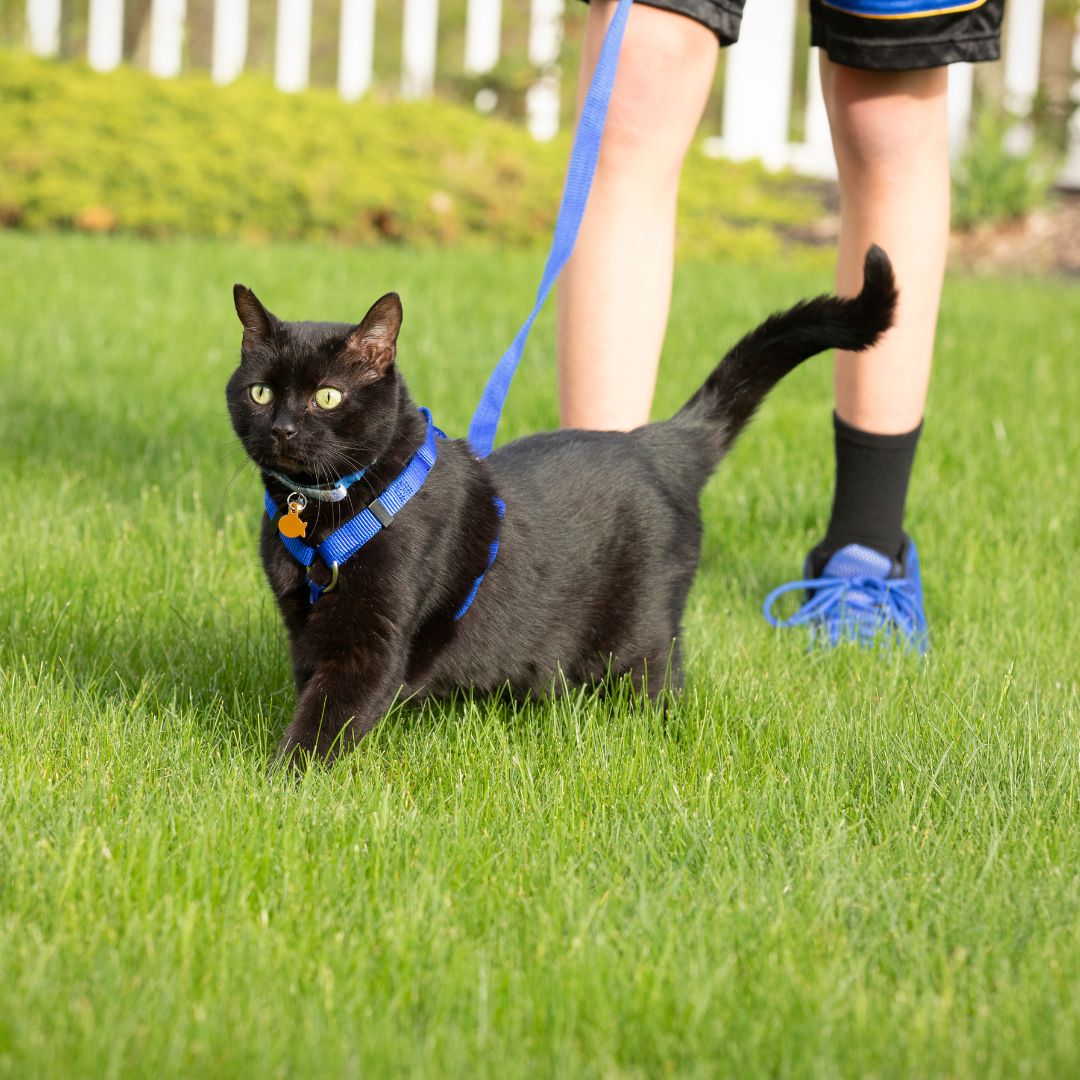
Keep an Eye on Them Outdoors
We recommend keeping outdoor cats indoors as much as possible. Dogs can be more easily supervised when outdoors with you, but free-roaming cats may wander far from view and come into contact with the virus by hunting or eating an infected bird, coming into contact with infected animals, or drinking from a tainted water source. Because cats are particularly vulnerable to this virus, opt instead to allow cats outdoor time while supervised or leashed, or get exercise indoors with a cat wheel or playtime.
As Always, Keep Them Healthy
Should a pet contract a viral infection, their overall health will affect their resilience and ability to battle infection. Ensure that pets have a rich and varied diet, have all their vaccinations, get regular veterinary checkups, and get physical exercise to keep their lungs and immune system healthy.
NHV’s Commitment to Safety
NHV was founded on the safety and well-being of pets, and this dedication shows up everywhere in our manufacturing process. With 3rd party testing of each ingredient for safety and efficacy, and the use of sterile bottles to keep contents safe, pet parents rely on the safety of our products.
Additionally, our supplement formulas contain no bird products and therefore pose no risk of contamination with the bird flu, so you can rest easy knowing that when you use an NHV supplement, your fur kiddo is only getting good stuff.
Supplements for Support
While influenza has no cure, we can promote healthy immune system functioning
While influenza has no cure, we can promote healthy immune system functioning. For example, ensuring that pets eat wholesome diets, get adequate exercise, and remain up-to-date on their vaccines will help them should they contract the bird flu. Additionally, certain supplements may play a role in their immune response. These supplements may be implemented proactively before a pet becomes sick.
Natures Immuno is a blend of medicinal mushrooms that have long been used in traditional Chinese medicine to support the immune system. Certain mushrooms in this blend, like cordyceps, have even been observed to have antiviral properties.
Additionally, should your fur kiddo contract HPAI or another viral infection, a supplement that focuses on respiratory wellness may be added as a support. NHV Resp-Aid contains a blend of 9 herbs which may help to clear the airways and allow pets to get better breaths in.
While the headlines about pets and bird flu may be scary, taking these precautions and being proactive about your little one’s immune system can make a difference.

Natures Immuno – Support for Pets Immune System
Natures Immuno- blend of mushrooms that help support immune function
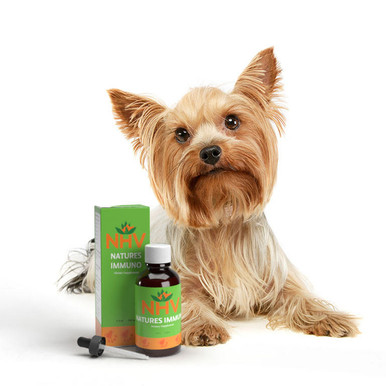
Natures Immuno- blend of mushrooms that help support immune function
- item number
- ph8600fbd
- weight
- 0.7
-
Description
- item number
- ph8600fbd
- weight
- 0.7
-
Ingredients
-
Dosage
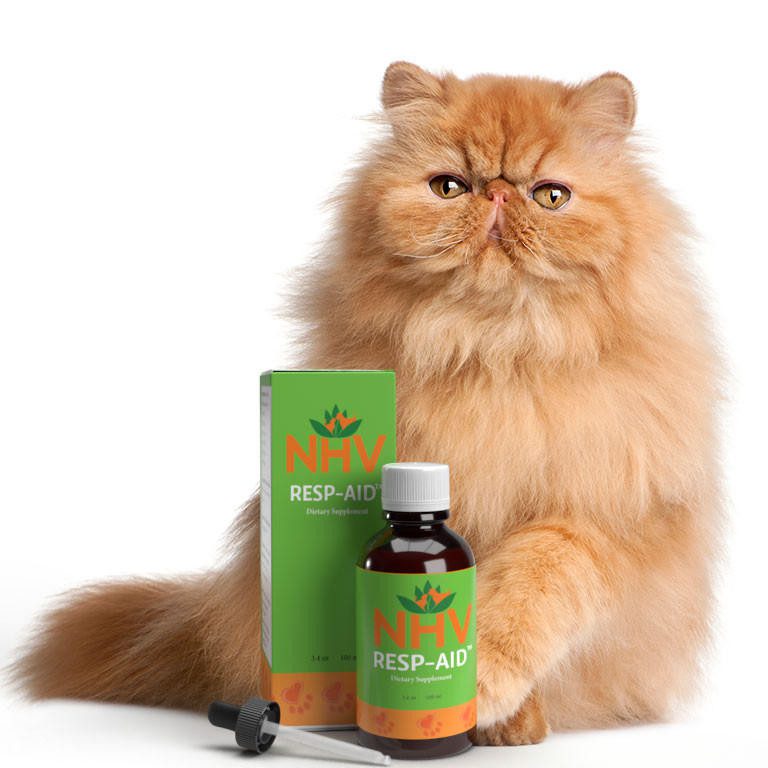
Resp-Aid for Pets – Support for Respiratory Issues in Pets
Resp Aid- helps support health respiratory function

Resp Aid- helps support health respiratory function
- item number
- ph1400
- weight
- 0.7
-
Description
- item number
- ph1400
- weight
- 0.7
-
Ingredients
-
Dosage
viral support
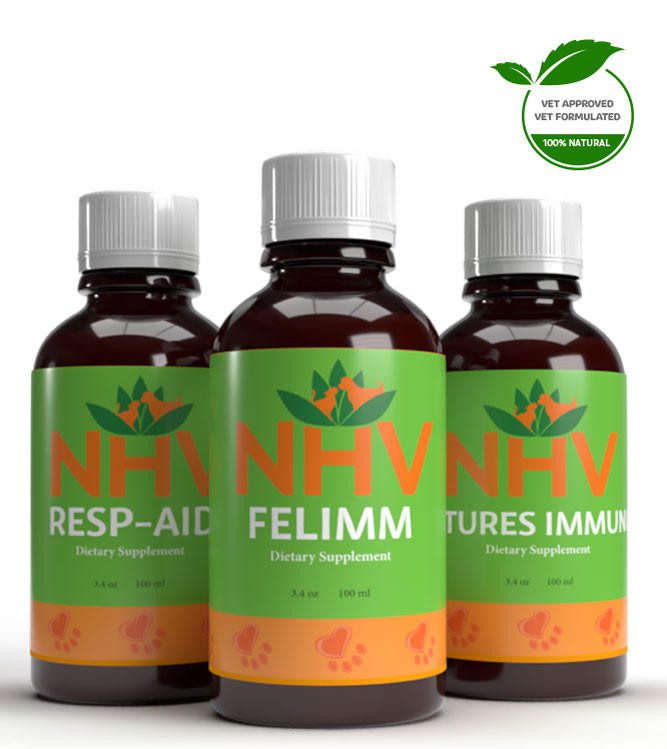
Viral Infections Fighter Pack
Viral Infections Fighter Pack
Felimm, Resp-Aid & Natures Immuno
bundle and save with pet expert kits
3 month supply for a small to medium size pet
What is it?
Help soothe inflammation and offer immune support for dogs and cats with NHV’s Viral Infections Fighter Pack - a natural supplement bundle for helping the body control and eliminate viral infections.
How does it work?
- Ideal support for viral and retroviral infections
- Helps relieve coughing, excess mucus, and inflammation
- Beneficial for pets with weakened immune systems or chronic infections
- Contains antioxidant, expectorant, and antiviral properties
Why should I trust it?
We have a team of friendly Pet Experts to help you choose your supplements and offer guidance.

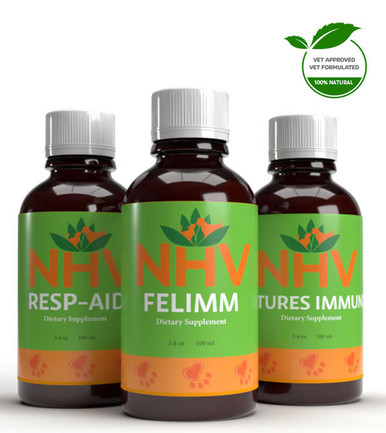
What is it?
Help soothe inflammation and offer immune support for dogs and cats with NHV’s Viral Infections Fighter Pack - a natural supplement bundle for helping the body control and eliminate viral infections.
How does it work?
- Ideal support for viral and retroviral infections
- Helps relieve coughing, excess mucus, and inflammation
- Beneficial for pets with weakened immune systems or chronic infections
- Contains antioxidant, expectorant, and antiviral properties
Why should I trust it?
We have a team of friendly Pet Experts to help you choose your supplements and offer guidance.

Natural Immune Support for Dogs and Cats
Is your furkiddo having chronic infections, persistent itchy skin or having breathing difficulties? Your pet may be suffering from a viral infection.
As pet parents, we all want what's best for our little ones. So if your furkiddo is struggling with a viral infection, there are natural ways to help manage symptoms and promote a faster recovery! With viruses like feline coronavirus or canine influenza, your furry friend may be suffering from constant inflammation and mucus in their body. In that case, there is a high likelihood that an infection may develop and cause their immune system to take a hit, especially if they are already dealing with chronic infections. This weakened immune function may lead to a buildup of toxins in the body. Our Viral Infections Fighter Pack contains Felimm, Resp-aid, and Natures Immuno, which work together to add antiviral support to your furkiddo’s immune system as well as help reduce inflammation, mucus buildup and promote faster recovery.
How NHV Supplements Help Fight Viral Infections in Cats and Dogs
With viral infections, especially in the respiratory tract, the body's natural healing process involves inflammation, so it can be tough to relieve a persistent cough or congestion that comes with excess mucus. The supplements in this bundle help to soothe inflammation, and help the body recover from infection.
FELIMM
- Helps fight against viruses like feline coronavirus, herpes, and other viral infections
- Helps to combat respiratory tract infections like bronchitis or kennel cough
- Contains herbs that have antioxidant, anti-inflammatory properties
- Encourages gentle detoxification
- May restore healthy appetite and calm a stressed-out pet
RESP-AID
- Ideal support for respiratory infections like canine parainfluenza or bronchitis
- Expectorant properties help to decrease mucus buildup
- Contains antiseptic and antioxidant properties
- Helps to relieve coughing and inflammation
NATURES IMMUNO
- A blend of medicinal mushrooms with antiviral and healing properties
- Contains antioxidant and free-radical scavenging properties
- Beneficial for pets with weakened immune systems or chronic infections
- Natural aid for adding immune, digestive, and cardiovascular support
- Helps protect the body from stress and illness
Comprehensive Support for Viral Infections - The Natural Way!
Let’s face it, no one wants to see their furkiddos suffer. That’s why we made all of our care products 100% natural, non-toxic, and made with only the best organic or wild-crafted ingredients. For any questions or concerns about natural approaches to immune support in dogs and cats, don’t hesitate to get in touch with an NHV Pet Expert - we’re always here for you!
- item number
- WT030420
- weight
- 2.1
- volume
- Each bottle - 3.4 fl. oz (100ml)
- form
- liquid
- life stages
- adult, senior, kitten
- made in
- canada
Made with the finest, organically grown, or ethically harvested herbs. Made specifically for pets, vet-formulated, and vet approved.
Felimm
- Alfalfa contains a range of vitamins, minerals, protein and antioxidants that help to cleanse the blood, the liver and intestines.
- Aloe Vera contains the compound acemannan, which helps to increase immune cells in the body and is recommended for pets battling an infection.
- Burdock is a nutrient dense herb with a range of minerals and antiviral properties that help to cleanse the body of toxins that may build up from illness.
- Cat’s Claw is rich in antioxidants that help to reduce cell damage from chronic illness. Its antiviral properties help the body fight off infectious diseases like herpes.
- Dandelion is a nutrient dense herb with anti-inflammatory properties that help to protect the kidneys and support liver function.
- Goldenseal is an herb with immune supporting and blood cleansing properties. It is effective against a range of infections such as sinusitis, colitis, candida albicans, tuberculosis and different respiratory infections.
- Gotu Kola is rich in antioxidants, which can help scavenge for free radicals and help calm a stressed out pet.
- Myrrh contains antiseptic, and anti-inflammatory properties to help control bacterial infections and help expel mucus buildup and help soothe congestion.
- Osha contains infection-fighting properties beneficial for colds and flu, respiratory inflammation, and for invading bacteria and viruses.
- St. John’s Wort has been used to fight different viral and retroviral infections such as FIV, herpes, viral hepatitis, feline corona virus and immunodeficiency infections.
- Turmeric is a rich source of antioxidants to help reduce the damaging effects of free radicals and to support healthy liver function.
- Usnea is an ideal herb for supporting the immune system. It is beneficial for sinus infections, colds, flus, herpes, canine parainfluenza and other infectious diseases.
Resp-Aid
- Coltsfoot is rich in flavonoids and other antioxidants which help reduce coughing, help relax spasms and soothe irritation in the respiratory tract.
- Ginger contains antiviral properties which are very helpful for fighting infections in the respiratory system. Its anti-inflammatory properties help to relieve discomfort, nausea and vomiting.
- Horehound contains antiseptic, anti-inflammatory and expectorant properties that are very beneficial for helping to control coughing and excess mucus buildup in the respiratory tract.
- Licorice has a long history of use to support the digestive, respiratory and endocrine systems. It helps to ease tissue damage and facilitate movement of mucus in the respiratory tract.
- Lobelia is very beneficial for allergies, coughing, congestion and infections in the nose, throat and chest. It helps to relax the respiratory system and encourages better blood oxygenation.
- Marshmallow is a soothing herb that may help to ease dry coughs and helps to soothe and protect irritated tissue. It also helps to trap and flush out bacterial infections.
- Mullein contains a range of infection-fighting properties that make it very beneficial for a range of respiratory issues.
- Myrrh is rich in antiseptic and astringent properties that help to fight bacterial infections and help speed up recovery.
- Plantain helps to ease coughing and helps reduce irritation in the chest, lungs and internal mucosa. It also contains astringent and anti-inflammatory properties.
Natures Immuno
- Agaricus contains polysaccharides that may help the body combat stress and is ideal support for auto-immune conditions or a weakened immune system.
- Cordyceps mushroom is rich in phytonutrients, antioxidants and antiviral properties. It may possess anti-cancer properties as well.
- Reishi mushroom is rich in beta-glucans which are helpful for supporting the immune system and heart health and promoting oxygenation of the blood.
- Shiitake mushroom is a good source of protein, amino acids, vitamins and minerals that help stimulate the body’s defence system against cancer cells, bacteria and viruses.
- Turkey Tail mushroom has a long history of use for supporting the immune system and help improve overall wellness.
Pet's Weight Dosage
To be taken twice daily. All NHV supplements are designed to be used together, and can, therefore, be given at once for convenience.
Select your pet's weight to determine the correct dose.
To be taken twice daily. All NHV supplements are designed to be used together, and can therefore be given at once for convenience.
Maintenance Dosage
1 drop for every 2 lb of body weight twice a day up to 50 lb. This is the minimum dosage. We recommend using this dosage when the supplements are being used as proactive care or for general health. When addressing a condition, we recommend using the therapeutic dosage (see below).
Determine your pet’s weight and then use the chart below to determine the correct dose.
Pet's Weight Dosage (twice daily)
0 - 15 lb 0.5 mL
16 - 30 lb 1.0 mL
31 - 45 lb 1.5 mL
46 - 60 lb 2.0 mL
61 - 75 lb 2.5 mL
Over 75 lb 3.0 mL
How to Administer
Shake well before use. The easiest method is to use the dropper provided and squirt directly into the pet’s mouth or add the correct dosage to your pet's food or favorite treat.
Some pets can be finicky, if this occurs consider hiding the drops in foods most pet’s love such as fish, chicken or yogurt or a favorite treat. If your pet only eats dry food then soak a few kibbles at feeding time.
For Best Results
Herbal dietary supplements are beneficial to the health and wellbeing of your pet and are safe for long-term use. Every pet responds to natural herbal supplements differently, therefore it is important to be consistent and administer the product daily. Supplements generally take two to four weeks to take effect, however this will vary from one animal to the another.
Product Storage
All NHV Natural Pet Products are pure herbal extracts and contain no added artificial additives, preservatives or coloring. Shelf life after opening is 6 months and must be refrigerated after opening
-
Description
Natural Immune Support for Dogs and Cats
Is your furkiddo having chronic infections, persistent itchy skin or having breathing difficulties? Your pet may be suffering from a viral infection.
As pet parents, we all want what's best for our little ones. So if your furkiddo is struggling with a viral infection, there are natural ways to help manage symptoms and promote a faster recovery! With viruses like feline coronavirus or canine influenza, your furry friend may be suffering from constant inflammation and mucus in their body. In that case, there is a high likelihood that an infection may develop and cause their immune system to take a hit, especially if they are already dealing with chronic infections. This weakened immune function may lead to a buildup of toxins in the body. Our Viral Infections Fighter Pack contains Felimm, Resp-aid, and Natures Immuno, which work together to add antiviral support to your furkiddo’s immune system as well as help reduce inflammation, mucus buildup and promote faster recovery.
How NHV Supplements Help Fight Viral Infections in Cats and Dogs
With viral infections, especially in the respiratory tract, the body's natural healing process involves inflammation, so it can be tough to relieve a persistent cough or congestion that comes with excess mucus. The supplements in this bundle help to soothe inflammation, and help the body recover from infection.
FELIMM
- Helps fight against viruses like feline coronavirus, herpes, and other viral infections
- Helps to combat respiratory tract infections like bronchitis or kennel cough
- Contains herbs that have antioxidant, anti-inflammatory properties
- Encourages gentle detoxification
- May restore healthy appetite and calm a stressed-out pet
RESP-AID
- Ideal support for respiratory infections like canine parainfluenza or bronchitis
- Expectorant properties help to decrease mucus buildup
- Contains antiseptic and antioxidant properties
- Helps to relieve coughing and inflammation
NATURES IMMUNO
- A blend of medicinal mushrooms with antiviral and healing properties
- Contains antioxidant and free-radical scavenging properties
- Beneficial for pets with weakened immune systems or chronic infections
- Natural aid for adding immune, digestive, and cardiovascular support
- Helps protect the body from stress and illness
Comprehensive Support for Viral Infections - The Natural Way!
Let’s face it, no one wants to see their furkiddos suffer. That’s why we made all of our care products 100% natural, non-toxic, and made with only the best organic or wild-crafted ingredients. For any questions or concerns about natural approaches to immune support in dogs and cats, don’t hesitate to get in touch with an NHV Pet Expert - we’re always here for you!
- item number
- WT030420
- weight
- 2.1
- volume
- Each bottle - 3.4 fl. oz (100ml)
- form
- liquid
- life stages
- adult, senior, kitten
- made in
- canada
-
Ingredients
Made with the finest, organically grown, or ethically harvested herbs. Made specifically for pets, vet-formulated, and vet approved.
Felimm
- Alfalfa contains a range of vitamins, minerals, protein and antioxidants that help to cleanse the blood, the liver and intestines.
- Aloe Vera contains the compound acemannan, which helps to increase immune cells in the body and is recommended for pets battling an infection.
- Burdock is a nutrient dense herb with a range of minerals and antiviral properties that help to cleanse the body of toxins that may build up from illness.
- Cat’s Claw is rich in antioxidants that help to reduce cell damage from chronic illness. Its antiviral properties help the body fight off infectious diseases like herpes.
- Dandelion is a nutrient dense herb with anti-inflammatory properties that help to protect the kidneys and support liver function.
- Goldenseal is an herb with immune supporting and blood cleansing properties. It is effective against a range of infections such as sinusitis, colitis, candida albicans, tuberculosis and different respiratory infections.
- Gotu Kola is rich in antioxidants, which can help scavenge for free radicals and help calm a stressed out pet.
- Myrrh contains antiseptic, and anti-inflammatory properties to help control bacterial infections and help expel mucus buildup and help soothe congestion.
- Osha contains infection-fighting properties beneficial for colds and flu, respiratory inflammation, and for invading bacteria and viruses.
- St. John’s Wort has been used to fight different viral and retroviral infections such as FIV, herpes, viral hepatitis, feline corona virus and immunodeficiency infections.
- Turmeric is a rich source of antioxidants to help reduce the damaging effects of free radicals and to support healthy liver function.
- Usnea is an ideal herb for supporting the immune system. It is beneficial for sinus infections, colds, flus, herpes, canine parainfluenza and other infectious diseases.
Resp-Aid
- Coltsfoot is rich in flavonoids and other antioxidants which help reduce coughing, help relax spasms and soothe irritation in the respiratory tract.
- Ginger contains antiviral properties which are very helpful for fighting infections in the respiratory system. Its anti-inflammatory properties help to relieve discomfort, nausea and vomiting.
- Horehound contains antiseptic, anti-inflammatory and expectorant properties that are very beneficial for helping to control coughing and excess mucus buildup in the respiratory tract.
- Licorice has a long history of use to support the digestive, respiratory and endocrine systems. It helps to ease tissue damage and facilitate movement of mucus in the respiratory tract.
- Lobelia is very beneficial for allergies, coughing, congestion and infections in the nose, throat and chest. It helps to relax the respiratory system and encourages better blood oxygenation.
- Marshmallow is a soothing herb that may help to ease dry coughs and helps to soothe and protect irritated tissue. It also helps to trap and flush out bacterial infections.
- Mullein contains a range of infection-fighting properties that make it very beneficial for a range of respiratory issues.
- Myrrh is rich in antiseptic and astringent properties that help to fight bacterial infections and help speed up recovery.
- Plantain helps to ease coughing and helps reduce irritation in the chest, lungs and internal mucosa. It also contains astringent and anti-inflammatory properties.
Natures Immuno
- Agaricus contains polysaccharides that may help the body combat stress and is ideal support for auto-immune conditions or a weakened immune system.
- Cordyceps mushroom is rich in phytonutrients, antioxidants and antiviral properties. It may possess anti-cancer properties as well.
- Reishi mushroom is rich in beta-glucans which are helpful for supporting the immune system and heart health and promoting oxygenation of the blood.
- Shiitake mushroom is a good source of protein, amino acids, vitamins and minerals that help stimulate the body’s defence system against cancer cells, bacteria and viruses.
- Turkey Tail mushroom has a long history of use for supporting the immune system and help improve overall wellness.
-
Dosage
Pet's Weight Dosage
To be taken twice daily. All NHV supplements are designed to be used together, and can, therefore, be given at once for convenience.
Select your pet's weight to determine the correct dose.
To be taken twice daily. All NHV supplements are designed to be used together, and can therefore be given at once for convenience.
Maintenance Dosage
1 drop for every 2 lb of body weight twice a day up to 50 lb. This is the minimum dosage. We recommend using this dosage when the supplements are being used as proactive care or for general health. When addressing a condition, we recommend using the therapeutic dosage (see below).Determine your pet’s weight and then use the chart below to determine the correct dose.
Pet's Weight Dosage (twice daily)
0 - 15 lb 0.5 mL
16 - 30 lb 1.0 mL
31 - 45 lb 1.5 mL
46 - 60 lb 2.0 mL
61 - 75 lb 2.5 mL
Over 75 lb 3.0 mLHow to Administer
Shake well before use. The easiest method is to use the dropper provided and squirt directly into the pet’s mouth or add the correct dosage to your pet's food or favorite treat.Some pets can be finicky, if this occurs consider hiding the drops in foods most pet’s love such as fish, chicken or yogurt or a favorite treat. If your pet only eats dry food then soak a few kibbles at feeding time.
For Best Results
Herbal dietary supplements are beneficial to the health and wellbeing of your pet and are safe for long-term use. Every pet responds to natural herbal supplements differently, therefore it is important to be consistent and administer the product daily. Supplements generally take two to four weeks to take effect, however this will vary from one animal to the another.Product Storage
All NHV Natural Pet Products are pure herbal extracts and contain no added artificial additives, preservatives or coloring. Shelf life after opening is 6 months and must be refrigerated after opening
Published: February 21, 2025

 USD
USD
 Canadian Dollars
Canadian Dollars





